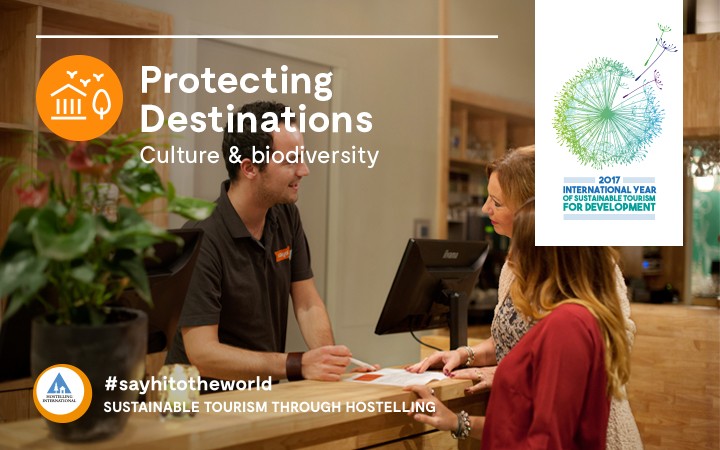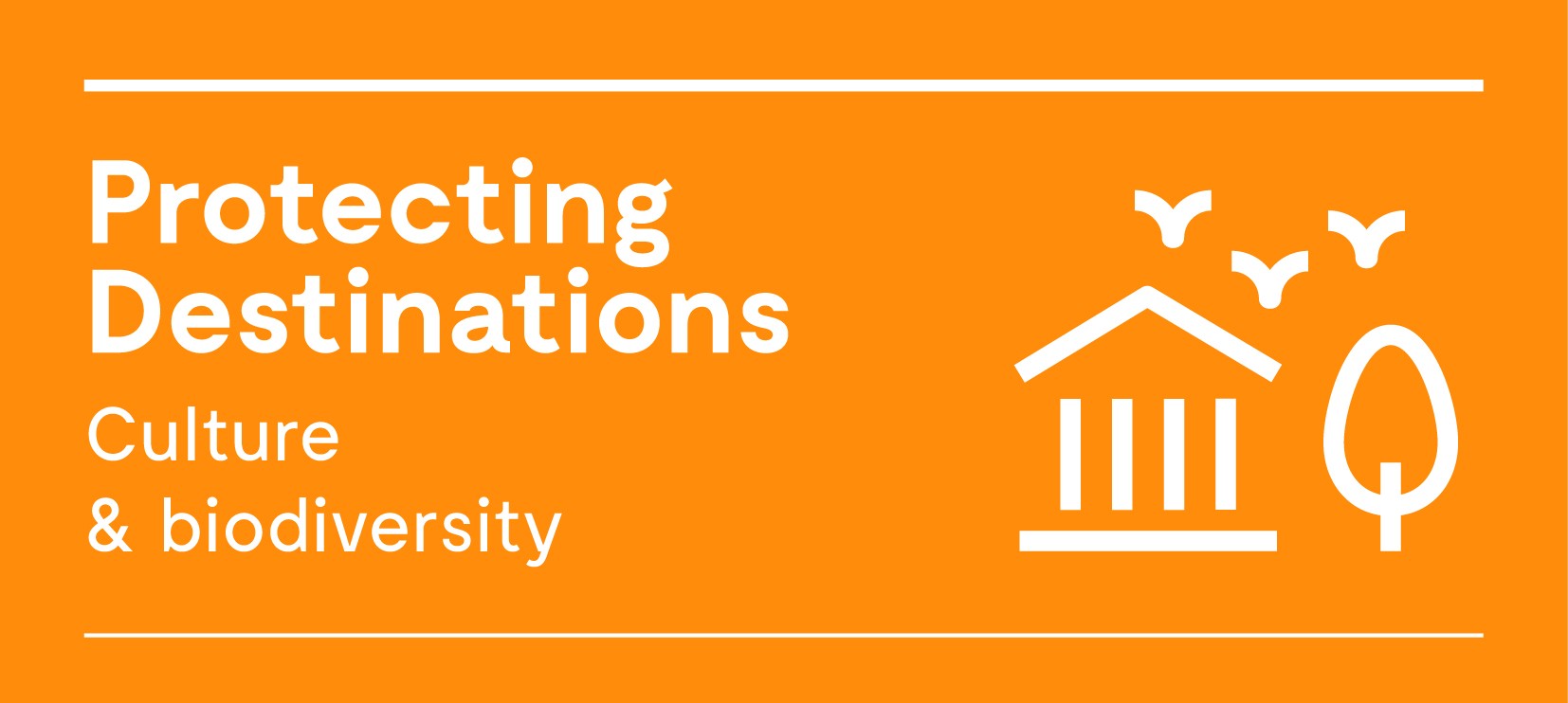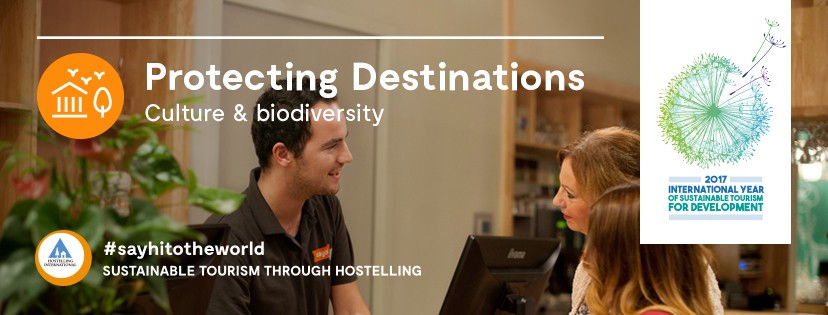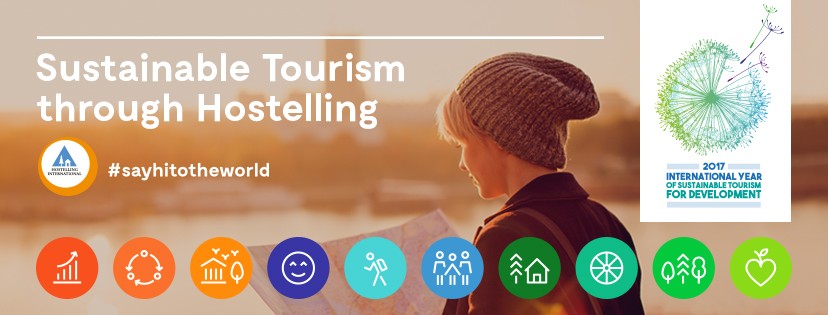Why do we travel? As well as meeting new people and getting out of our personal comfort zones, culture and biodiversity are two of the main reasons travellers choose to visit certain locations. Don’t you also enjoy witnessing the majestic flora and fauna of a rainforest or learning about the culture of ancient civilisations? These are both important to tourism, yet essential to the local communities and their everyday life. That is why we must carefully help to consider, maintain and protect these destinations, so that we can ensure their sustainability for future generations of local people, as well as for visitors.
Throughout this year we have been celebrating the Sustainable Tourism through Hostelling campaign with 10 different areas of responsible travelling while showcasing fantastic initiatives from the HI Hostels around the world.
In October we continue the campaign with:
Everything from beehives to cultural and environmental educational programs, our HI Hostels offer you the full hostelling experience, which is so much more than a comfortable night’s sleep.
Why should we protect the destinations of our hostels?
Destinations are not just visitor attractions, they are home to different people of diverse cultures and unique biodiversity. Both of which are some of the main reasons why tourists travel there in the first place. At HI, we acknowledge the importance of protecting everything that a destination is, so that future generations can also learn about the diverse culture and biodiversity of that particular place. We believe in the positive impacts our travellers have on the community, and on preserving a destination’s natural assets.
Many of our hostels are located in UNESCO world heritage sites (670+!), further enhancing our commitment to welcome travellers who seek to discover the history of a destination and its people while learning about ways to protect it. In our project examples for this month, you will see the impact of being located in a certified world heritage site, as well as independent initiatives that advance our mission. From alternative ways of educating and engaging visitors on the historical and archaeological importance of their sites with the Israeli YHA, to busy bees on the rooftops and the Conservation Plan that helps preserve the native Irish habitat.
Did you know that 100 Spanish hostels (REAJ) are located near 44 UNESCO world heritage sites? Check them out.
We believe that by implementing sustainable actions in our daily activities, our hostels can act as a bridge to spread and maintain the principles of sustainable tourism, therefore ensuring the balance between the needs and interests of our guests, our host communities and the environment. In this way, through our hostels’ activities we also have the potential to help the entire tourism industry increase their resilience to the socio-economic-environmental challenges caused by climate change or other internal or external factors.
These are the Sustainable Development Goals (SDGs) related to this month’s theme:
Here are some inspiring examples of how our hostels are addressing the topic:

Read more about IYHA’s life changing educational programs |
A different kind of education with the Israeli Youth Hostel AssociationFully recognising its educational mission, the Israeli YHA has education centres offering a wide range of programs for students, teaching staff, soldiers, visitors, tourists and others. The programs offer a fascinating and tangible experience, adapted to the geographic and historic location of each hostel, and providing added value beyond the accommodation. Activities are held in Hebrew and English, including in the evenings, some by prior arrangement, serving both guests of the hostel and outside visitors. Read more about IYHA’s educational programs and make sure you get the chance to enjoy them yourself! |
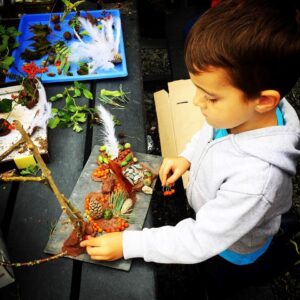 Read more about An Óige’s Conservation Plan |
The Knockree Youth Hostel Conservation PlanThe Irish Youth Hostel Association – An Óige – is on a mission to make their guests and members aware of the importance of environmental issues near their hostels. A volunteer-led Conservation Group was formed in 2007, and since then has worked tirelessly to identify threats, grants, management and educational options to help preserve the native Irish habitats around Knockree Youth Hostel. |
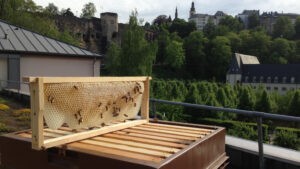
Read more about Luxembourg YHA’s busy bees |
Busy bees on Luxembourg City Hostel‘s rooftop!Due to the (well-documented) decline of bees and their essential environmental function, the Luxembourg City youth hostel decided in 2013 to collaborate with a local beekeeper and lend its roof to three colonies of bees. By doing so, they want to support the local biodiversity and raise awareness of both the vital importance and harmlessness of bees. Not to mention you get to try the honey at the in-house restaurant. <3 |

Read more about STF’s initiatives |
Protecting Destinations with the Swedish Tourist Association (STF)The Swedish Tourist Association (STF) believes it should be easy and inspiring to discover Sweden in a sustainable way and they hope that their vision of encouraging people to discover Sweden will bring people closer together, while at the same time increasing commitment for the preservation of natural and cultural values. |

Read more about the Mei Ho House Revitalisation Project |
Mei Ho House Revitalisation ProjectThe Heritage of Mei Ho House (HMHH) museum is the first privately-run museum of Hong Kong Housing established and operated by the Hong Kong Youth Hostels Association. The hostel offers anything from collecting and preserving artefacts, research, education and exhibition of Hong Kong’s community development, living environments and aspects of social life since the 1950s. From guided tours to cultural events, the Mei Ho House provides an authentic social and cultural experienced to all its visitors. |
How can YOU contribute?
- Commit to responsible behaviour towards the environment, local cultures and host communities when travelling in your own country and around the world.
- Have a look at the World Travel and Tourism Council (WTTC) pledges for sustainable tourism – ‘Is it too much to ask?’ To start with, will you commit to making these promises to protect the destinations you visit?
- Do your research. Make sure the activities (especially those involving local populations or wildlife) you take part in are committed to the long-term sustainability of the destination. Don’t be afraid to ask questions and contribute to encouraging sustainable tourism practices.
- Think twice before buying souvenirs or taking natural mementos of your trip, the flora and fauna are there for a reason and shouldn’t be removed for your own benefit.
- Get to know the locals! Try to avoid sticking to very touristic areas, you will learn far more about the destination and its culture if you interact with the communities who know it best. Hiring local guides and buying locally-made gifts and souvenirs will also help support the local community and the receiving destination.
- Protect and respect the local environment. Share your responsible actions using the hashtags #sayHItotheworld and #TravelEnjoyRespect.
- Vote in the Hostelling International Sustainability Fund (HISF)! Every year, the hostels within our network apply to the HISF to receive funding for their CO2 emission reducing projects. This year’s entries are now open to the public vote. One third of the decision is down to you, so make sure you vote for your favourite project! See our blog for more information about the fund, the shortlisted projects and how to cast your vote.
What can our hostels do?
These are some of the suggestions we make to our hostels through the HI Sustainability Charter:
- Follow established guidelines or a code of behavior for visits to culturally or historically sensitive sites, in order to minimize visitor impact and maximize enjoyment.
- Ensure that historical and archaeological artefacts are not sold, traded, or displayed, except as permitted by local and international laws.
- Contribute to the protection and preservation of local historical, archaeological, culturally and spiritually important properties and sites, whilst not impeding access to the them by residents.
- Use native species for landscaping and restoration, wherever feasible, particularly in natural landscapes and take measures to avoid the introduction of invasive alien species.
- Support biodiversity conservation, including nature; protected areas and areas of high biodiversity value.
- Ensure that captive wildlife is not held, except for properly regulated activities, in compliance with local and international laws and living specimens of protected and wildlife species are only kept by those authorized and suitably equipped to house and care for them humanely.
- Ensure that interactions with wildlife, considering cumulative impacts, do not produce adverse effects on the viability and behavior of populations in the wild, and any disturbance is minimized, rehabilitated, and there is a compensatory contribution to conservation management.
How will you commit to protecting the culture and biodiversity of the places you visit? Have you been inspired by any of our suggestions? Let us know in the comments below!
